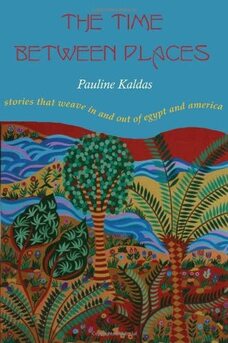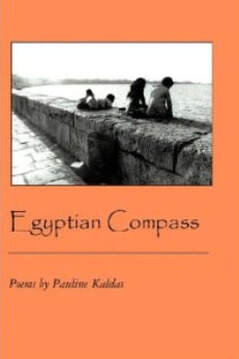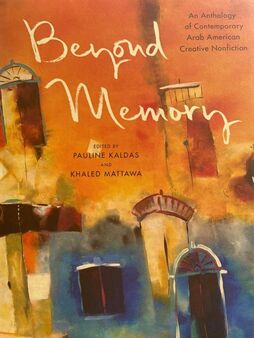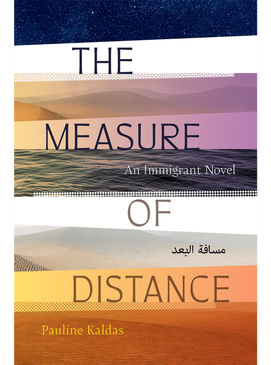
The Measure of Distance
University of Arkansas Press, 2023
This family saga begins when Salim, the eldest of three brothers, moves to Cairo at the start of the twentieth century with dreams of opening his own bakery. His decision to leave his ancestral village of Kom Ombo despite his parents’ objections reverberates across generations, kicking off a series of migrations that shape the lives of his family and their descendants throughout the decades that follow. These migrations only intensify after the revolution of 1952—with Misha, Salim’s eldest grandchild, being the first to flee to “Amreeka.”
Culminating with the 2011 protests in Tahrir Square, Pauline Kaldas’s The Measure of Distance is a detailed portrait of immigration against the backdrop of an Egypt in constant flux and an America that is always falling short of the fantasy. Alternating between tales of those who migrate and those who stay, this expansive novel follows its characters as they determine the course of their lives, often choosing one uncertainty over another as they migrate to new lands or plant their roots more firmly in their homeland.
University of Arkansas Press, 2023
This family saga begins when Salim, the eldest of three brothers, moves to Cairo at the start of the twentieth century with dreams of opening his own bakery. His decision to leave his ancestral village of Kom Ombo despite his parents’ objections reverberates across generations, kicking off a series of migrations that shape the lives of his family and their descendants throughout the decades that follow. These migrations only intensify after the revolution of 1952—with Misha, Salim’s eldest grandchild, being the first to flee to “Amreeka.”
Culminating with the 2011 protests in Tahrir Square, Pauline Kaldas’s The Measure of Distance is a detailed portrait of immigration against the backdrop of an Egypt in constant flux and an America that is always falling short of the fantasy. Alternating between tales of those who migrate and those who stay, this expansive novel follows its characters as they determine the course of their lives, often choosing one uncertainty over another as they migrate to new lands or plant their roots more firmly in their homeland.
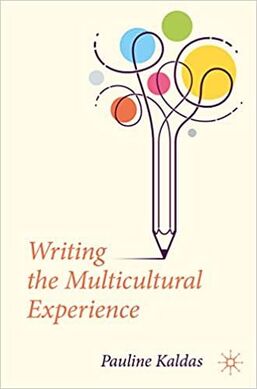
Writing the Multicultural Experience
Palgrave Macmillan, 2022
This textbook takes a new approach to teaching creative writing that centers the
concerns of multicultural students. It focuses on the experiences of those who wish
to write through their diverse identities, including ethnic, cultural, racial, national,
regional, and international identity as well as gender identity, sexual preference, class position, and disability. Combining the study of culturally diverse literature with the process of writing, students are encouraged to engage with various texts and to use them to inspire their own work. Organized around a series of writing prompts and discussions of literary readings that address identity, place, perception, family, community, encounters, inheritance, and resistance, this book offers both writers and teachers a way to engage with the practice of writing from a multicultural perspective.
Palgrave Macmillan, 2022
This textbook takes a new approach to teaching creative writing that centers the
concerns of multicultural students. It focuses on the experiences of those who wish
to write through their diverse identities, including ethnic, cultural, racial, national,
regional, and international identity as well as gender identity, sexual preference, class position, and disability. Combining the study of culturally diverse literature with the process of writing, students are encouraged to engage with various texts and to use them to inspire their own work. Organized around a series of writing prompts and discussions of literary readings that address identity, place, perception, family, community, encounters, inheritance, and resistance, this book offers both writers and teachers a way to engage with the practice of writing from a multicultural perspective.
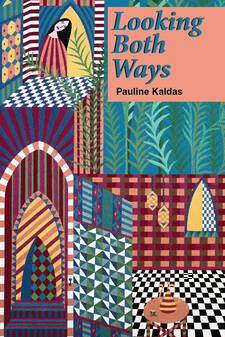
Looking Both Ways
Cune Press, 2017
Looking Both Ways is a collection of interlinked essays that explores family, language, politics, identity, and culture. These essays move across time and space, beginning in Egypt and crossing the ocean to follow the author s travels and the challenges of adapting to American culture and creating a family in her new world. From recounting her attempt to retrieve a stolen nativity camel to relaying her sense of cultural indignation when her husband tells her to follow a recipe, these essays use humor to dive deeper into the experience of what it means to live as an Egyptian in the United States. This book explores culture, identity, and displacement, offering a unique vision into the Arab American immigrant experience.
Cune Press, 2017
Looking Both Ways is a collection of interlinked essays that explores family, language, politics, identity, and culture. These essays move across time and space, beginning in Egypt and crossing the ocean to follow the author s travels and the challenges of adapting to American culture and creating a family in her new world. From recounting her attempt to retrieve a stolen nativity camel to relaying her sense of cultural indignation when her husband tells her to follow a recipe, these essays use humor to dive deeper into the experience of what it means to live as an Egyptian in the United States. This book explores culture, identity, and displacement, offering a unique vision into the Arab American immigrant experience.
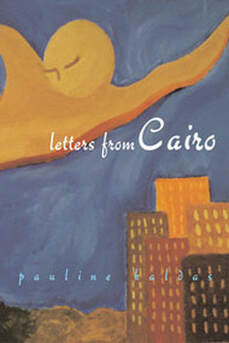
Letters from Cairo
Syracuse University Press, 2007
When her husband is offered a Fulbright grant to teach at Cairo University, Pauline Kaldas embarks on a new journey—and an opportunity to return home. Born in Egypt, she immigrated with her parents to the United States when she was eight years old. Returning now with her own children, Kaldas writes form a perspective as an Arab-American, straddling two homelands and two identities. Through a collection of letters, journal entries, essays, and even local recipes, she provides a richly detailed portrait of life in Cairo. Kaldas offers insight into the complexities of Egyptian culture, alternately taking on roles of linguist and cultural interpreter and addressing everything from class issues and political activism to education and the impact of Western culture. Marked by spare, graceful prose, this book captures the images, character, and passion of an extraordinary country.
Syracuse University Press, 2007
When her husband is offered a Fulbright grant to teach at Cairo University, Pauline Kaldas embarks on a new journey—and an opportunity to return home. Born in Egypt, she immigrated with her parents to the United States when she was eight years old. Returning now with her own children, Kaldas writes form a perspective as an Arab-American, straddling two homelands and two identities. Through a collection of letters, journal entries, essays, and even local recipes, she provides a richly detailed portrait of life in Cairo. Kaldas offers insight into the complexities of Egyptian culture, alternately taking on roles of linguist and cultural interpreter and addressing everything from class issues and political activism to education and the impact of Western culture. Marked by spare, graceful prose, this book captures the images, character, and passion of an extraordinary country.
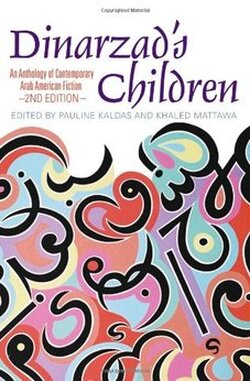
Dinarzad’s Children: An Anthology of Contemporary Arab American Fiction, 2nd ed.
Edited by Pauline Kaldas and Khaled Mattawa
University of Arkansas Press, 2009
The first edition of Dinarzad’s Children was a groundbreaking and popular anthology that brought to light the growing body of short stories being written by Arab Americans. This expanded edition is now organized into sections that invite readers to enter the stories from a variety of directions. Here are stories that reveal the initial adjustments of immigrants, the challenges of forming relationships, the political nuances of being Arab American, the vision directed toward homeland, and the ongoing search for balance and identity. Contributors include Nabeel Abraham, Rabih Alameddine, Susan Muaddi Darraj, Joseph Geha, Yussef El Guindi, Hedy Habra, Rawi Hage, Laila Halaby, Diana Abu Jaber, Randa Jarrar, Mohja Kahf, Pauline Kaldas, Zahie El Khouri, Amal Masri, Khaled Mattawa, D.H. Mehlem, May Munsoor Munn, Sahar Mustafah, Francis Khirallah Nobel, Samia Serageldin, Evelyn Shakir, Patricia Sarrafian Ward, David Williams, and Alia Yunis.
Edited by Pauline Kaldas and Khaled Mattawa
University of Arkansas Press, 2009
The first edition of Dinarzad’s Children was a groundbreaking and popular anthology that brought to light the growing body of short stories being written by Arab Americans. This expanded edition is now organized into sections that invite readers to enter the stories from a variety of directions. Here are stories that reveal the initial adjustments of immigrants, the challenges of forming relationships, the political nuances of being Arab American, the vision directed toward homeland, and the ongoing search for balance and identity. Contributors include Nabeel Abraham, Rabih Alameddine, Susan Muaddi Darraj, Joseph Geha, Yussef El Guindi, Hedy Habra, Rawi Hage, Laila Halaby, Diana Abu Jaber, Randa Jarrar, Mohja Kahf, Pauline Kaldas, Zahie El Khouri, Amal Masri, Khaled Mattawa, D.H. Mehlem, May Munsoor Munn, Sahar Mustafah, Francis Khirallah Nobel, Samia Serageldin, Evelyn Shakir, Patricia Sarrafian Ward, David Williams, and Alia Yunis.
|
Beyond Memory: An Anthology of Contemporary Arab American Creative Nonfiction Edited by Pauline Kaldas and Khaled Mattawa University of Arkansas Press, 2020 This anthology brings together the voices of both new and established Arab American writers in a compilation of creative nonfiction that reveals the stories of the Arab diaspora. Originating from different cultures and including first- and second-generation immigrants as well as those whose identities encompass more than a single culture, these writers tell stories that speak to the complexity of the Arab American experience. Contributors include Elmaz Abinader, George Abraham, Nabeel Abraham, Rabih Alameddine, Hayan Charara, Safia Elhillo, Joseph Geha, Hadil Ghoneim, Layla Azmi Goushey, Tariq Al Haydar, Randa Jarrar, Fady Joudah, Joe Kadi, Mohja Kahf, Pauline Kaldas, Laila Lalami, Lisa Suhair Majaj, Khaled Mattawa, Iman Mersal, Philip Metres, Susan Muaddi Darraj, Naomi Shihab Nye, Steven Salaita, Mathew Shenoda, Kamelya Omayma Youssef.
|
